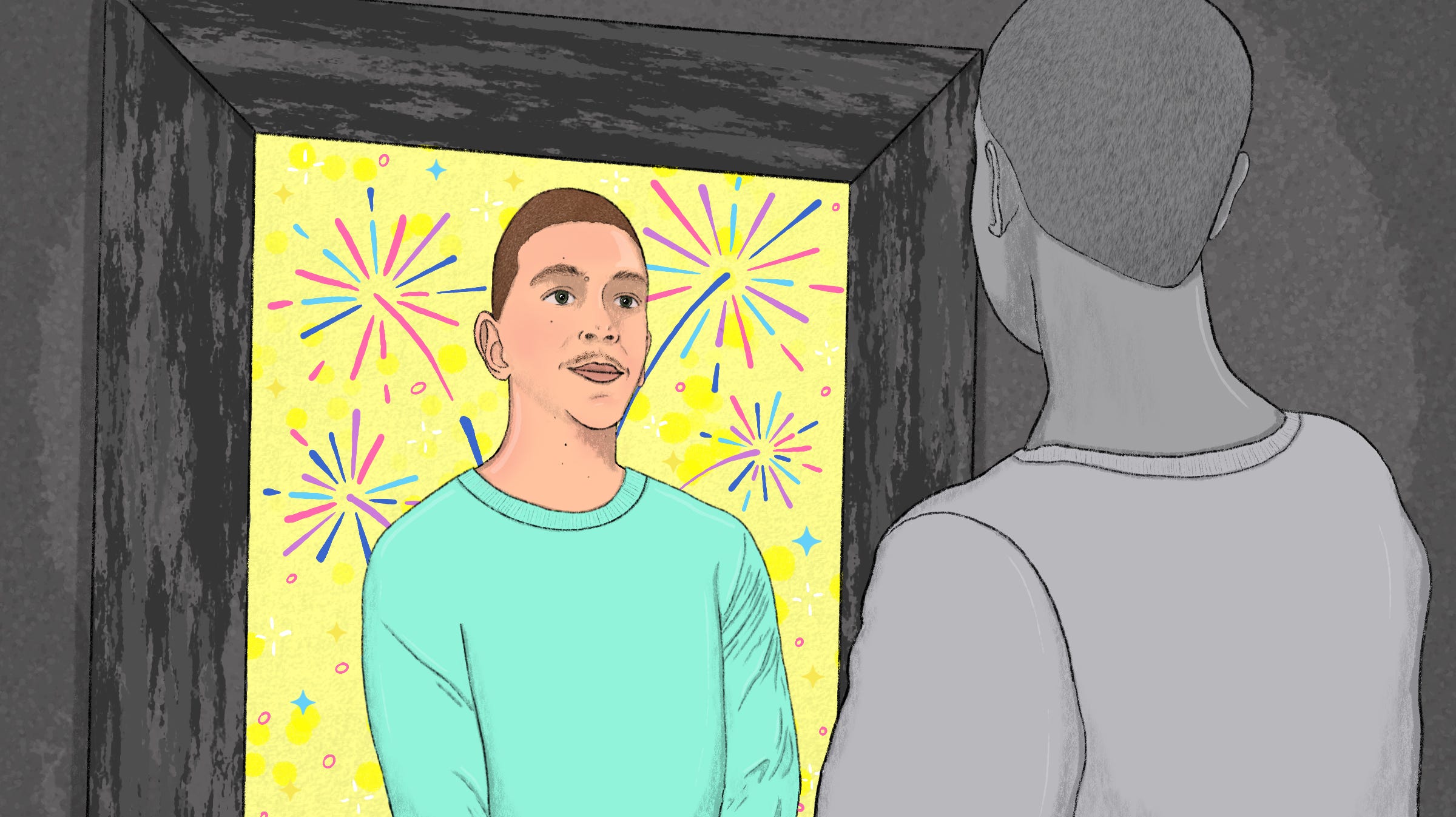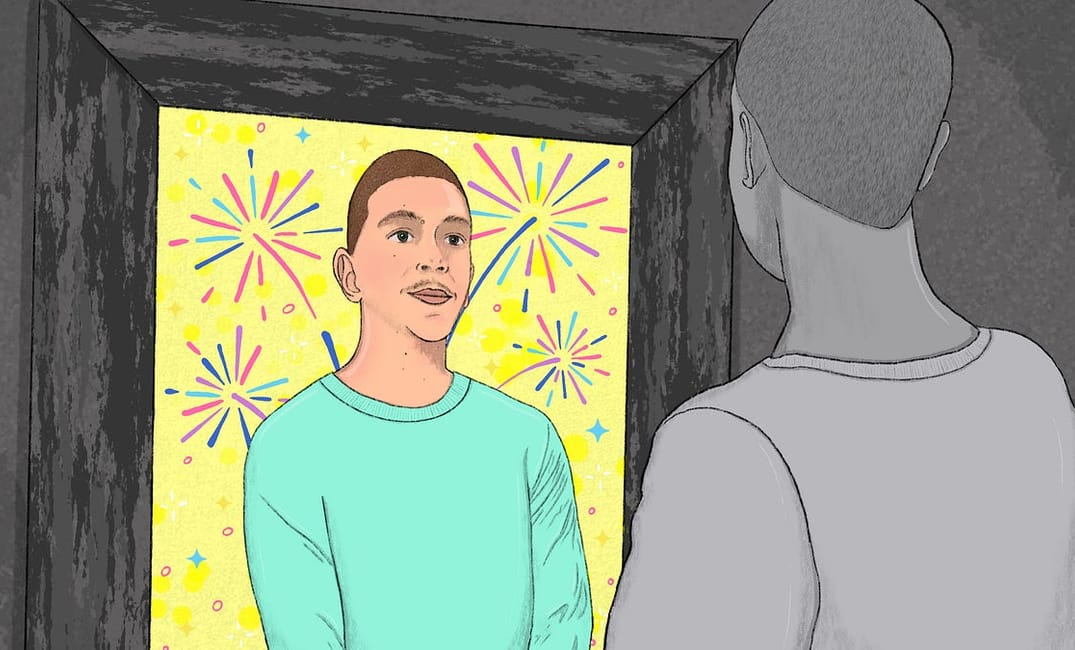
I remember exactly where I was when I saw the news that the Bay Area was going into the nation’s shelter-in-place order: sitting on my old antique couch in Los Angeles. As I watched the headlines scroll over my TV, I started to cry.
I’m not exactly sure why the tears came, but it was as if In that moment the weight of the pandemic — and the fact that it was going to be worse than we thought—hit me full force. I knew that if San Francisco made such a drastic move, Los Angeles would surely follow close behind. Just two days later, we did.
At that time a year ago, I was going by the name Whit, a shortened version of the name I was given at birth. I identified as transgender and nonbinary, and I had started taking a low dose of testosterone. I knew I wasn’t female, but I wasn’t sure about the endgame. I wasn’t sure I wanted to transition; I wasn’t even sure what it meant to do so.
I finally had enough space to ponder, to wonder, and then to open myself up to ask the hard question: Who am I?
I uprooted to the Bay Area, thinking this shelter-in-place thing would last maybe just a few more months. My friend and I took a walk one balmy spring day before I left L.A., and they tried referring to me as “he” casually in conversation. It felt like the shoe that fit, my own real-life Cinderella slipper, as the words rolled off their tongue.
“He.”
It was perfect. I gave little thought to what it meant that I wanted to be referred to as “him.”
Once I arrived in Oakland, quarantining and newly unemployed, I found myself with a lot of time on my hands. A long, tall mirror was stuck to the bedroom door in my new apartment. When I stared into it, I could see my face, my body, my self — with downtown Oakland behind me. I loved that mirror. I’d sit on the edge of my bed and stare right into it. I could see my true self.
Maybe it was the boredom—that all there really was to do was sit with me, myself, and I. Maybe it was that I didn’t have as much societal feedback; since I wasn’t out in the world, there was less of a chance of being misgendered. Maybe as the world slowed down, so did I, finally having enough space to ponder, to wonder, and then to open myself up to ask the hard question: Who am I?
I found myself cringing when people referred to me as “ma’am.” So great was my dysphoria around my monthly cycle that it almost sent me to the emergency room last May. I’d buckle and writhe in pain, and after that incident I knew it was time to transition, medically, to male. I was living in a body that, fundamentally, did not feel like mine.
I stared at myself in the mirror shortly after that, yet again, and I knew the answer to the hard “Who am I?” question. I am a man. I’d always been a man. And I wanted to transition. My boobs needed to go, and I was tired of my feminine face. I started to cry. Realizing you were born into the wrong body is a weighty realization.
I was terrified. And I looked nothing like a man, according to my hard-ingrained gender dysphoria. I still saw a woman when I looked in the mirror, and it was painful to see. What I felt and what I saw were two different things. The disconnect that is gender dysphoria felt debilitating at times.While y’all were out marching for Black Lives Matter on the streets of Oakland and San Francisco, I was stuck in bed indoors because I couldn’t be around that many people who would read me as a woman. The pandemic gave me the excuse I needed to hide indoors, away from a world that cruelly genders you on the basis of physical appearance.
I wanted nothing more than to go into a cave for nine months and come back out a man. That’s precisely what happened.
I felt a deep grief for me as I mourned the loss of her and the emergence of him.
Prior to sheltering in place, I was so busy running from social engagement to social engagement that I missed what was right in front of me: my manhood. I’m not sure I would have realized I was male if not for the experience of quarantine. There was something about the sudden silence, the stillness, the quiet that abounded that all of a sudden allowed me space to be myself. Something shifted within me.
My early days of manhood were hard. I struggled emotionally with what it meant to be a man. I spent a lot of time existentially pondering it all. I’m a deep thinker and psychologically minded. (I am a therapist, too, by the way.)
Was I really ready to leave Whitney behind and build a life as Daniel? I felt a deep grief for me as I mourned the loss of her and the emergence of him. On the most confusing days, I didn’t even know what my name was. I just knew that if one more person tried to call me Whit I was going to have a nervous breakdown.
I tried a couple names before landing on Daniel. I tried on versions of my birth name: Whit, and then Whitman. I tried changing my former last name to a first name, East. It seemed poetic. I tried Bobby, my godfather’s first name. But that seemed like his name, not mine. Eventually, I landed at Daniel, my other Cinderella slipper. And then I knew my name.
Over the past year, I began to medically transition from female to male. In the summer of 2020, I got my first injection of testosterone in the glute — a bright spot in an otherwise dreary summer of the plague.
From there, my transition was like an avalanche. Changes snowballed one into the other. The most significant transition was social: I went from being perceived as a straight woman to a queer man. The world used to perceive me as straight, but now my love of men signified my bisexuality. I transitioned genders, and the men I dated also shifted. Whereas gay men used to be my closest friends, gay men became my lovers. And while in quarantine, I had my first gay male partner.
I felt myself mature from boyhood to manhood. I got more comfortable in my transgender skin. I had my boobs surgically removed. (I’m fortunate to live in a place where gender-affirming care continued to be accessible during the pandemic — it sadly hasn’t been that way everywhere.) My voice dropped so deep that I had to start singing in the bass section of my choir (virtually, of course). My upper lip is now dusted with the first sign of my growing mustache.
Today, I very rarely get mistaken for a woman. I’m less afraid to walk in the world.
A year ago, people often still called me “ma’am.” That’s been replaced with “hey, man” or “sir.” I use to fight back tears on days when my gender dysphoria got the better part of me. Now it’s surreal to be read as male, or “pass,” most days.
The first time I remember this happening was at the Taco Bell in West Oakland when a kind stranger handed me my crunchy tacos and uttered the gender-affirming words: “Have a great night, sir.” I almost started crying. I wanted to jump through the drive-thru window and hug him. I refrained.
I’m celebrating one year on testosterone just as we’re celebrating the pandemic’s one-year anniversary. When I reflect on this milestone, I ache for all we have lost. I long to be in a Pride parade with my fellow queer and trans people in the streets. Yet I celebrate what I’ve gained: the transformation in my body, mind, and soul.
Bizarrely enough, quarantine has turned me into the man of my dreams.







